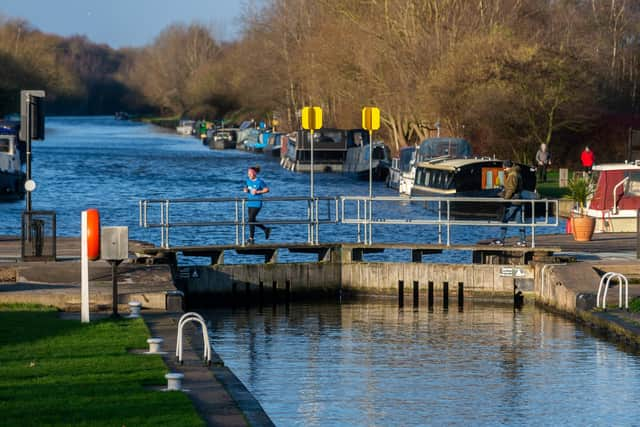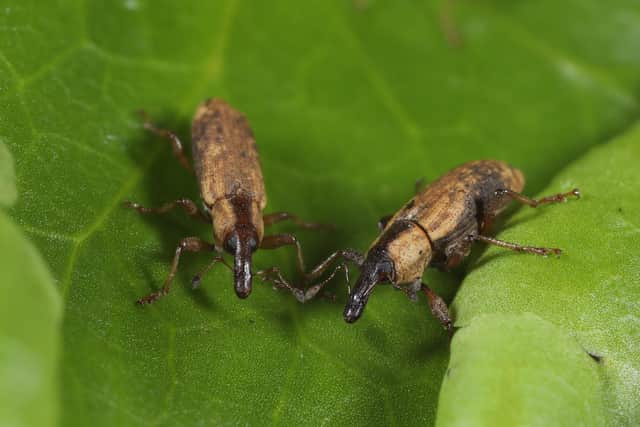Specialist weevils deployed in Aire and Calder Navigation and River Holme to tackle invasive plant
The weevils have been introduced on the Aire and Calder Navigation and one of the tributaries of the River Holme, in a collaboration by Yorkshire Water, the Centre for Agriculture and Bioscience International (CABI), Leeds Council, River Holme Connections and a private landowner.
The bugs – which are commonly less than six milimetres long – have evolved to only feed and develop on floating pennywort (hydrocotyle ranunculoide) and will target the plant where it is clogging up the waterways.
Advertisement
Hide AdAdvertisement
Hide AdFloating pennywort is native to Central and South America, and was brought to the UK in the 1980s as an ornamental pond plant, but escaped into natural habitats where it can grow up to 20cm a day.


It forms dense vegetative mats on water courses, reducing the availability of oxygen for fish and aquatic insects, chokes drainage systems, outcompetes native water plants and poses a risk to livestock, dogs and human health, the team behind the release said.
Following a decade of safety and efficacy testing by CABI, South American weevils have been approved for release as a natural pest control for the invasive plant, which avoids the need for mechanical or chemical interference.
The adult weevils feed on the leaves of floating pennywort and females lay eggs into their stalks, where larvae then eat into the stems of the plant, reducing its ability to grow and spread further.
Advertisement
Hide AdAdvertisement
Hide AdDr Steph Bradbeer, invasive species and biosecurity adviser at Yorkshire Water, says: “Invasive non-native species pose a very real risk to Yorkshire’s environment and wildlife.


“They can also impact on our ability to treat and distribute water to homes and return wastewater safely to the environment.
“Floating pennywort, if unchecked, can cause significant problems in slow-flowing watercourses and impact drainage systems.
“We hope the release of these specialist weevils will provide a way of tackling it without the need for mechanical or chemical intervention.”
Advertisement
Hide AdAdvertisement
Hide AdDjami Djeddour, senior project scientist at CABI, added: “These weevil releases are the culmination of over a decade of collaboration with South American scientists and comprehensive safety and efficacy testing in our quarantine facilities, so it is thrilling to finally get them out into the wild.”


The weevils will be closely monitored, with their impact on the spread of floating pennywort also carefully monitored.
It is hoped they will help improve local wildlife and water quality, reduce the plant’s impact on flood defences and control the spread of floating pennywort in rivers.
From Leeds, the Aire and Calder Navigation flows to the tidal River Ouse at Goole. It runs for more than 30 miles from Leeds to Goole, with another smaller branch from Wakefield to Castleford.
Advertisement
Hide AdAdvertisement
Hide AdMeanwhile, from its source on the moors above Holmfirth, the River Holme and its tributaries flow north before joining the River Colne at Aspley near Huddersfield town centre.
Leeds City Council executive member for infrastructure and climate, Coun Helen Hayden, said: “Leeds City Council are continuously exploring ways to improve our processes to benefit the environment and reduce financial pressures on our services. The control measures to keep our flood defences clear of invasive non-native species are reoccurring tasks for our team, they can be costly, time intensive and may rely on the use of chemicals. We look forward to the positive impact to local biodiversity and water quality from the introduction of the weevils and will welcome any further innovations on tackling invasive non-native species.”
Simon Hirst, river steward at River Holme Connections, adds: “We are excited to be involved in this novel project, and we hope the weevil can control and prevent the spread of floating pennywort in the Holme Valley.”
In January 2013, the coalition Government announced that floating pennywort would be banned from sale in order to protect wildlife, at the time saying that it costed the British economy £23.5 million per year.
Yorkshire Wildlife Trust previously described invasive non-native species as “only second to habitat destruction as the biggest threat to biodiversity”.